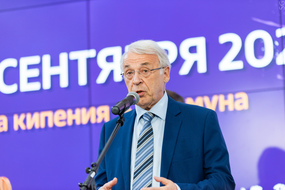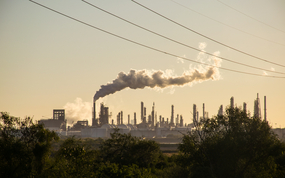Reducing the consumption of fossil fuels is not enough to prevent the world’s average annual temperature from rising by two or more degrees above pre-industrial levels. Russian scientists at NUST MISIS are convinced, that global climate change cannot be stopped without the development of technologies for removing carbon dioxide from the air. The results of their study are presented in the Thermal Engineering journal.
The anthropogenic factor is considered to be the main cause of climate change. The use of fossil fuels, agriculture and forestry are among the main drivers of global warming.
In accordance with the Paris Climate Agreement signed in 2015, the world community is striving to prevent the global average annual temperature on the planet from exceeding 2°C above pre-industrial levels by 2100 and to do everything possible to keep warming within 1.5°C.
According to last year’s report of the United Nation’s Intergovernmental Panel on Climate Change (IPCC), this decade is the last chance for humanity to take the measures needed to slow global warming.
Scientists from NUST MISIS, the Moscow Power Engineering Institute and the Energy Research Institute of the Russian Academy of Sciences have analyzed key trends in global energy and climate indicators, and concluded that although the goals of the Paris Climate Agreement are unattainable, there is no reason for apocalyptic sentiment.
Despite the fact that fossil fuels account for up to 90% of carbon dioxide emissions, the intensity of CO2 emissions per unit of energy consumed has steadily decreased over the past 100 years, the authors of the study note.
However, energy consumption in each country is highly dependent on climate and geographical factors. With the world’s population projected to grow to 10 billion people, global energy consumption will rise to
This theory does not take into account the geographical factor: most of the so-called developed countries are located in the middle and high latitudes, and up to 40% of all energy consumption is spent on space heating. In addition, climate change is also having an impact on energy consumption. Thus, according to various estimates, the total energy consumption in Russia over the past 30 years has decreased by
Alexander Klimenko, Academician of the Russian Academy of Sciences, Leading Expert at the NUST MISIS Competence Center
“In our work, we explain the discrepancy between the constant increase in the concentration of carbon dioxide in the atmosphere and the non-monotonic increase in global temperature. There are periods when its growth is clearly slowing down and even halting. It would seem that the higher the concentration of carbon dioxide, the greater the greenhouse effect, the higher the temperature. In fact, the global temperature is also influenced by other factors — not of anthropogenic, but of natural origin. Taking into account all factors allows us to understand the nature of the change in global temperature and build reliable forecasts of its behavior in the future.”
In their forecast, Russian researchers predict that the anthropogenic impact on climate systems will soon begin to weaken, and the peak values of carbon dioxide emissions will be reached in
In achieving full carbon neutrality, the so-called carbon capture technologies (“carbon traps”) will help: the ocean, living biota (forests) and geological formations capable of capturing and retaining carbon dioxide. However, natural resources in this sense are limited, so achieving global carbon neutrality exclusively by natural capacity by 2050 doesn’t seem feasible.
Industrial technologies for removing carbon dioxide from the air can help to control the rate of warming without completely abandoning fossil fuels, but they are now expensive, which is an obstacle to their widespread distribution. At present, only 26 such facilities operate worldwide in eight countries, and their combined capacity is only sufficient to capture less than one tenth of a per cent of total emissions.
However, the authors of the study are confident that without the development of such technologies, the goal of keeping global warming below 2°C by the end of this century will not be achievable.




